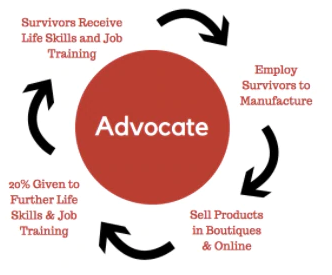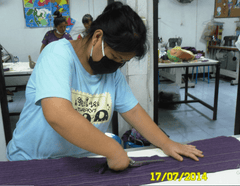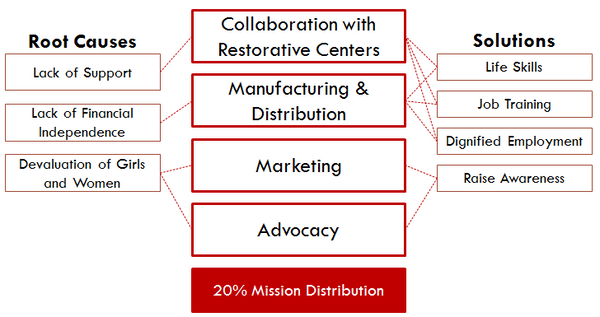Our Impact
Creating a World Free of Human Trafficking
We partner with multiple restorative centers around the world to offer dignified employment for the products we source. Each of them supports marginalized and exploited women by offering them an alternative to poverty and vulnerability. These centers have been carefully chosen as places that will offer these women job skills, a sense of their own value, and fair wages.
-
PREVENTION: Lack of financial independence is a significant reason people are lured into trafficking situations. Providing dignified employment and paying artisans a living wage helps to end the cycle of extreme poverty in vulnerable populations, which can help prevent exploitation and sex trafficking.
-
RESTORATION: Without the ability to support herself, a woman becomes vulnerable again. Dignified employment for women who have been rescued from life as a sex slave in red-light districts and brothels around the world is essential. After a time of healing and training in a safe house, survivors “need jobs, not pity.”
- AWARENESS: Through its ever-growing networking both online and through events hosted in partnership with global campaigns, Made for Freedom is working to help educate the public at large about risk factors of human trafficking. Unknowingly their everyday decisions may inadvertently support human trafficking. Made for Freedom and its founder firmly believe that awareness is an important cornerstone in fighting human trafficking. Awareness helps people to think outside themselves and consider how their choices can affect others. Awareness can open hearts and minds to be more compassionate.
How we help
As a social enterprise, we exist to free and empower women from sex slavery, and to work to end human trafficking. Through the sale of ethical products such as jewelry, clothing, and fashion accessories. Our mission is to generate dignified employment. As a result, all of the money from your purchase is used in one of two ways:
Empowerment: The percentages vary for each partner center, but we only source quality products from centers that support survivors of exploitation and marginalization with comfortable fair wages, a safe working environment, and development programs.
Growth: The more products we source and sell from our partner centers, the more jobs they are able to provide.
Providing dignified employment

Poverty and lack of economic independence are the two root causes that make women and children vulnerable to exploitation.*
We partner with centers providing dignified employment in India and Thailand through our orders of Creabeli pants, tees and bags. Even our promotional products provide dignified employment which translates as:
- a fair wage
- reasonable working hours
- a safe and comfortable work space
"Job training and professional development are critical in helping survivors move on. Traffickers keep victims isolated from support and opportunity. Thus, for many survivors, it can be extremely difficult to enter the workforce after escaping a trafficking situation. To support a survivor’s lasting recovery, we need to create more opportunities for survivors to build new skills that will allow them to be self-supporting and independent over time."**
In all of our key activities, we are fighting the root causes and providing solutions.

In addition to employing survivors, 20% of our profits will be invested in strategic organizations who are boots-on-the-ground organizations combating global human trafficking at its source. (We are in talks with centers in Cambodia, Cameroon, Ghana, India, Kenya, and Thailand.)
What is a social enterprise?
Social enterprises are businesses whose primary purpose is the common good. They use the methods and disciplines of business and the power of the marketplace to advance their social, environmental and human justice agendas (Social Enterprise Alliance).
Made for Freedom is proud to be a social enterprise offering fashion and lifestyle products created by survivors and those at-risk of human trafficking.
We can only fulfill this impact with your support. When you purchase any of our fashion products, you help support this work.
Looking to help in a bigger way? Spread the message of our work on social media! You can find us on Facebook, Twitter, and Pinterest!
Human trafficking is a global epidemic
Human trafficking, which includes sex slavery, is the fastest growing illegal industry in our world today. The number of people being exploited in what is often called "modern day slavery" ranges from 21 to 28 million. This is not only an isolated issue — it is a pandemic.

Know the facts about sex trafficking
- Since 2007, the National Human Trafficking Resource Center hotline, operated by Polaris, has received reports of 14,588 sex trafficking cases inside the United States. Find more hotline statistics here.*
- In 2014, the National Center for Missing & Exploited Children estimated that 1 in 6 endangered runaways reported to them were likely sex trafficking victims.*
- Globally, the International Labor Organization estimates that there are 4.5 million people trapped in forced sexual exploitation globally.*
- In a 2014 report, the Urban Institute estimated that the underground sex economy ranged from $39.9 million in Denver, Colorado, to $290 million in Atlanta, Georgia.*
*Statistics and Information from the PolarisProject.org.
Who are these human traffickers? How do they exploit the vulnerabilities of others?
While talking about Made for Freedom, I once had someone ask me, “So who are the bad guys in this situation?” This kind of question seems natural since we all wonder how anyone could be responsible for the unfathomably cruel acts of modern-day slavery. The truth is that many different players within the sex trade make its existence possible. Just as vulnerability varies between victims, so do the methods and affiliations of traffickers.
Based on the size of their operations, traffickers use different approaches to rope in women: lone wolves, sophisticated crime organizations, and small-time brothels. Though the approaches vary, the process is often similar — typically following the two general stages of procurement/transportation and destination.
Recruiters/agents, brothel owners, brothel managers, landlords, and police/border control are all involved in these processes.
So how do so many women and children go from their home town, living with their family, to being enslaved, beaten, starved, and drugged — often moved to a large city and sold for sexual pleasure? Each journey starts with the exploitation of the victim’s vulnerabilities by a recruiter or agent.
Human Trafficking Recruiters and Agents
Those who initially contact the victims, known as the recruiter or procurer, seek out and exploit vulnerable populations. Often this position is filled by a woman who offers the hope of a better life, job, and security that supposedly comes from working in a larger city far away. Many times, this recruiter is actually a member of the community.* In Cambodia, about 50% of girls sold into brothels were sold by someone they knew.* In countless rural areas, smaller villages, and areas hit hard by economic downturn, few jobs are available and pay less than a living wage. Families faced with the reality that they do not have enough resources to keep their family fed and healthy often feel they have no choice but to turn to those offering promises of a great paying job in the cities. This desperation also induces parents to accept dubious offers of marriage for their daughters.
The potential husband convinces them that he will provide well for her where he lives and even offers an upfront “gift” of money. After they are married, the man sells his new bride to brothel owners.
In Western countries, recruiters often exploit personal vulnerability, such as emotional insecurity, homelessness, domestic or sexual abuse, and social discrimination. In 2014, the National Center for Missing & Exploited Children estimated that 1 in 6 endangered runaways reported were likely sex trafficking victims.
The “Romeo” seeks out insecure young women and children. He makes them feel special, loved, and valued. Once he has gained her loyalty, he asks her to sell her body for him. Desperate to hold on to the relationship, and with few options, she relents.
Recruiters and human traffickers target areas with intense regional political instability, like areas torn by war or armed conflict. Refugees are among the most vulnerable populations. Desperate to escape a dangerous situation, families see a trafficker’s promise of safe travel across borders as their only choice. If refugees make it to another country, they are often confined to specific areas and not allowed to seek employment within the host country. This lack of opportunity and resources makes the recruiters’ false promise of work seem like the only viable option. Procurers exploit the natural desire for keeping loved ones safe and protected when deceiving refugees attempting to escape life-threatening situations.
Natural disasters, such as earthquakes, floods, or drought, can stress and fracture already limited government infrastructures, creating desperate conditions. Similar to the situation in which most refugees find themselves, victims of natural disaster have lost everything and often must seek new employment opportunities elsewhere, which can make them vulnerable to the false promises made by human traffickers.
Feeling overwhelmed and disheartened in the face of such a vast problem is natural, but every person can help and provide hope. Start today.
First, push for laws that cripple the demand for sex trafficking. Send your congressional representative a letter expressing your desire to see such laws introduced and passed.
Second, you can help keep people out of vulnerable situations by purchasing from companies that pay a living wage to their laborers. Made for Freedom is a part of a growing number of companies that choose to not only give back, but to keep people out of poverty by paying them a living wage, which prevents the cycle of exploitation.
*Statistics and Information from: Kara, Siddharth (2009-01-22). Sex Trafficking: Inside the Business of Modern Slavery (Kindle Location 237). Columbia University Press. Kindle Edition.
What do fast fashion and modern day slavery have in common?
Many of the fashion industry's largest retailers employ the practice often called "fast fashion". Fast fashion is the practice of paying workers the lowest wage legally permissible in order to keep costs low and volume high. The only way such a volume of clothing can be offered at such low prices is due to paying workers a poverty wage and by using low quality materials. Those who make the majority of our clothes are paid poverty wages and forced to work grueling schedules in atrocious working conditions.
The average American adds an average of 62 pieces of clothing, made in this way, to their wardrobe each year. Fast fashion makes those who make our clothing vulnerable and deepens the cycle of extreme poverty. This vulnerability empowers traffickers to exploit the working poor.
Consumers, like you and I, in developed nations have helped to create this system (slavery footprint). The good news is you and I are also the solution! Our shopping habits/choices impact the lives of others we may never even meet. You vote for the kind of world you want to see with your wallet, EVERY DAY. We have to change our relationship with our closet. We can stop this cycle!
*Impact of the global economic crisis on women, girls and gender equality Discussion Paper. Switzerland, UNAIDS 2012
**http://www.safehorizon.org/page/lessons-learned-in-the-fight-to-end-human-trafficking-65.html


